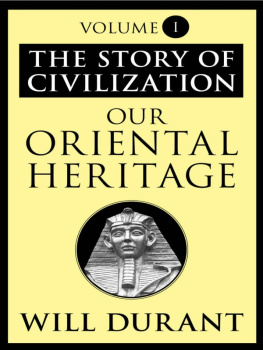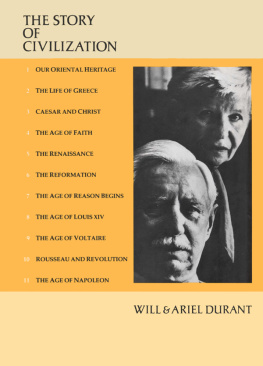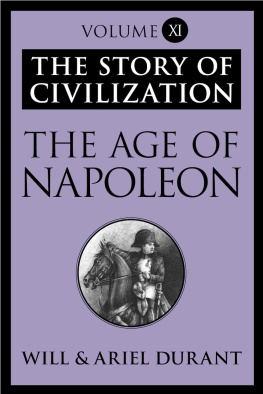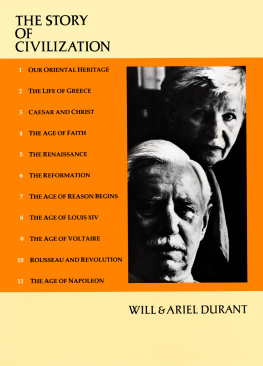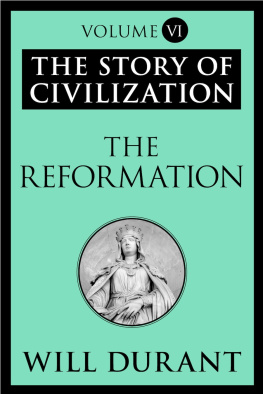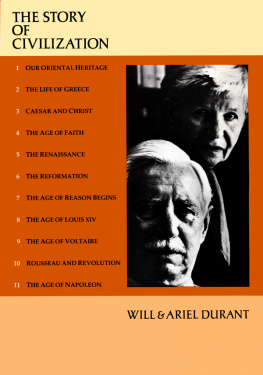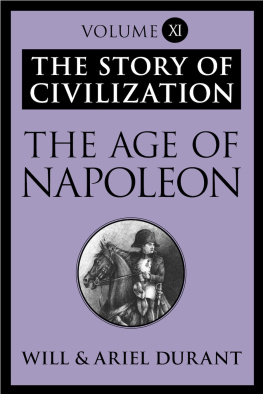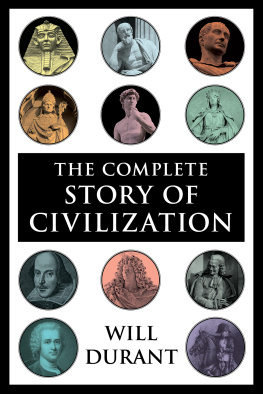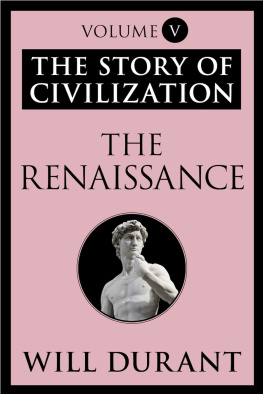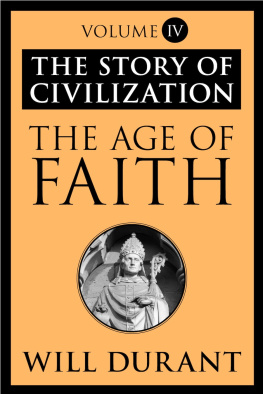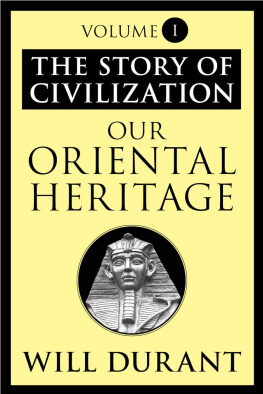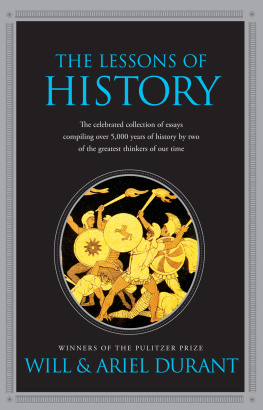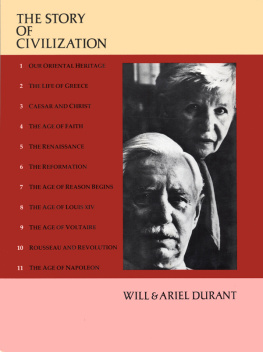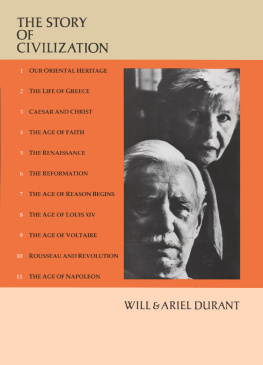


BY WILL DURANT
The Story of Philosophy
Transition
The Pleasure of Philosophy
Adventures in Genius
BY WILL AND ARIEL DURANT
T HE S TORY OF C IVILIZATION
1. Our Oriental Heritage
2. The Life of Greece
3. Caesar and Christ
4. The Age of Faith
5. The Renaissance
6. The Reformation
7. The Age of Reason Begins
8. The Age of Louis XIV
9. The Age of Voltaire
10. Rousseau and Revolution
11. The Age of Napoleon
The Lessons of History
Interpretation of Life
A Dual Autobiography

Copyright 1935 by Will Durant
Copyright renewed 1963 by Will Durant
ALL RIGHTS RESERVED
including the right of reproduction
in whole or in part in any form
Published by Simon and Schuster
A Division of Gulf & Western Corporation
Simon & Schuster Building
Rockefeller Center
1230 Avenue of the Americas
New York, New York 10020
www.SimonandSchuster.com
SIMON AND SCHUSTER and colophon are trademarks of Simon & Schuster
ISBN 0-671-54800-X
Library of Congress Catalog Card Number 35-10016
MANUFACTURED IN THE UNITED STATES OF AMERICA
TO ARIEL
Preface
I HAVE tried in this book to accomplish the first part of a pleasant assignment which I rashly laid upon myself some twenty years ago: to write a history of civilization. I wish to tell as much as I can, in as little space as I can, of the contributions that genius and labor have made to the cultural heritage of mankindto chronicle and contemplate, in their causes, character and effects, the advances of invention, the varieties of economic organization, the experiments in government, the aspirations of religion, the mutations of morals and manners, the masterpieces of literature, the development of science, the wisdom of philosophy, and the achievements of art. I do not need to be told how absurd this enterprise is, nor how immodest is its very conception; for many years of effort have brought it to but a fifth of its completion, and have made it clear that no one mind, and no single lifetime, can adequately compass this task. Nevertheless I have dreamed that despite the many errors inevitable in this undertaking, it may be of some use to those upon whom the passion for philosophy has laid the compulsion to try to see things whole, to pursue perspective, unity and understanding through history in time, as well as to seek them through science in space.
I have long felt that our usual method of writing history in separate longitudinal sectionseconomic history, political history, religious history, the history of philosophy, the history of literature, the history of science, the history of music, the history of artdoes injustice to the unity of human life; that history should be written collaterally as well as lineally, synthetically as well as analytically; and that the ideal historiography would seek to portray in each period the total complex of a nations culture, institutions, adventures and ways. But the accumulation of knowledge has divided history, like science, into a thousand isolated specialties; and prudent scholars have refrained from attempting any view of the wholewhether of the material universe, or of the living past of our race. For the probability of error increases with the scope of the undertaking, and any man who sells his soul to synthesis will be a tragic target for a myriad merry darts of specialist critique. Consider, said Ptah-hotep five thousand years ago, how thou mayest be opposed by an expert in council. It is foolish to speak on every kind of work. A history of civilization shares the presumptuousness of every philosophical enterprise: it offers the ridiculous spectacle of a fragment expounding the whole. Like philosophy, such a venture has no rational excuse, and is at best but a brave stupidity; but let us hope that, like philosophy, it will always lure some rash spirits into its fatal depths.
The plan of the series is to narrate the history of civilization in five independent parts:
I. Our Oriental Heritage: a history of civilization in Egypt and the Near East to the death of Alexander, and in India, China and Japan to the present day; with an introduction on the nature and elements of civilization.
II. Our Classical Heritage: a history of civilization in Greece and Rome, and of civilization in the Near East under Greek and Roman domination.
III. Our Medieval Heritage: Catholic and feudal Europe, Byzantine civilization, Mohammedan and Judaic culture in Asia, Africa and Spain, and the Italian Renaissance.
IV. Our European Heritage: the cultural history of the European states from the Protestant Reformation to the French Revolution.
V. Our Modern Heritage: the history of European invention and statesmanship, science and philosophy, religion and morals, literature and art from the accession of Napoleon to our own times.
Our story begins with the Orient, not merely because Asia was the scene of the oldest civilizations known to us, but because those civilizations formed the background and basis of that Greek and Roman culture which Sir Henry Maine mistakenly supposed to be the whole source of the modern mind. We shall be surprised to learn how much of our most indispensable inventions, our economic and political organization, our science and our literature, our philosophy and our religion, goes back to Egypt and the Orient, At this historic momentwhen the ascendancy of Europe is so rapidly coming to an end, when Asia is swelling with resurrected life, and the theme of the twentieth century seems destined to be an all-embracing conflict between the East and the Westthe provincialism of our traditional histories, which began with Greece and summed up Asia in a line, has become no merely academic error, but a possibly fatal failure of perspective and intelligence. The future faces into the Pacific, and understanding must follow it there.
But haw shall an Occidental mind ever understand the Orient? Eight years of study and travel have only made this, too, more evidentthat not even a lifetime of devoted scholarship would suffice to initiate a Western student into the subtle character and secret lore of the East. Every chapter, every paragraph in this book will offend or amuse some patriotic or esoteric soul: the orthodox Jew will need all his ancient patience to forgive the pages on Yahveh; the metaphysical Hindu will mourn this superficial scratching of Indian philosophy; and the Chinese or Japanese sage will smile indulgently at these brief and inadequate selections from the wealth of Far Eastern literature and thought. Some of the errors in the chapter on Judea have been corrected by Professor Harry Wolf son of Harvard; Dr. Ananda Coomaraswamy of the Boston Institute of Fine Arts has given the section on India a most painstaking revision, but must not be held responsible for the conclusions I have reached or the errors that remain; Professor H. H. Gowen, the learned Orientalist of the University of Washington, and Upton Close, whose knowledge of the Orient seems inexhaustible, have checked the more flagrant mistakes in the chapters on China and Japan; and Mr. George Sokolsky has given to the pages on contemporary affairs in the Far East the benefit of his first-hand information. Should the public be indulgent enough to call for a second edition of this book, the opportunity will be taken to incorporate whatever further corrections may be suggested by critics, specialists and readers. Meanwhile a weary author may sympathize with Tai Tung, who in the thirteenth century issued his
Next page
